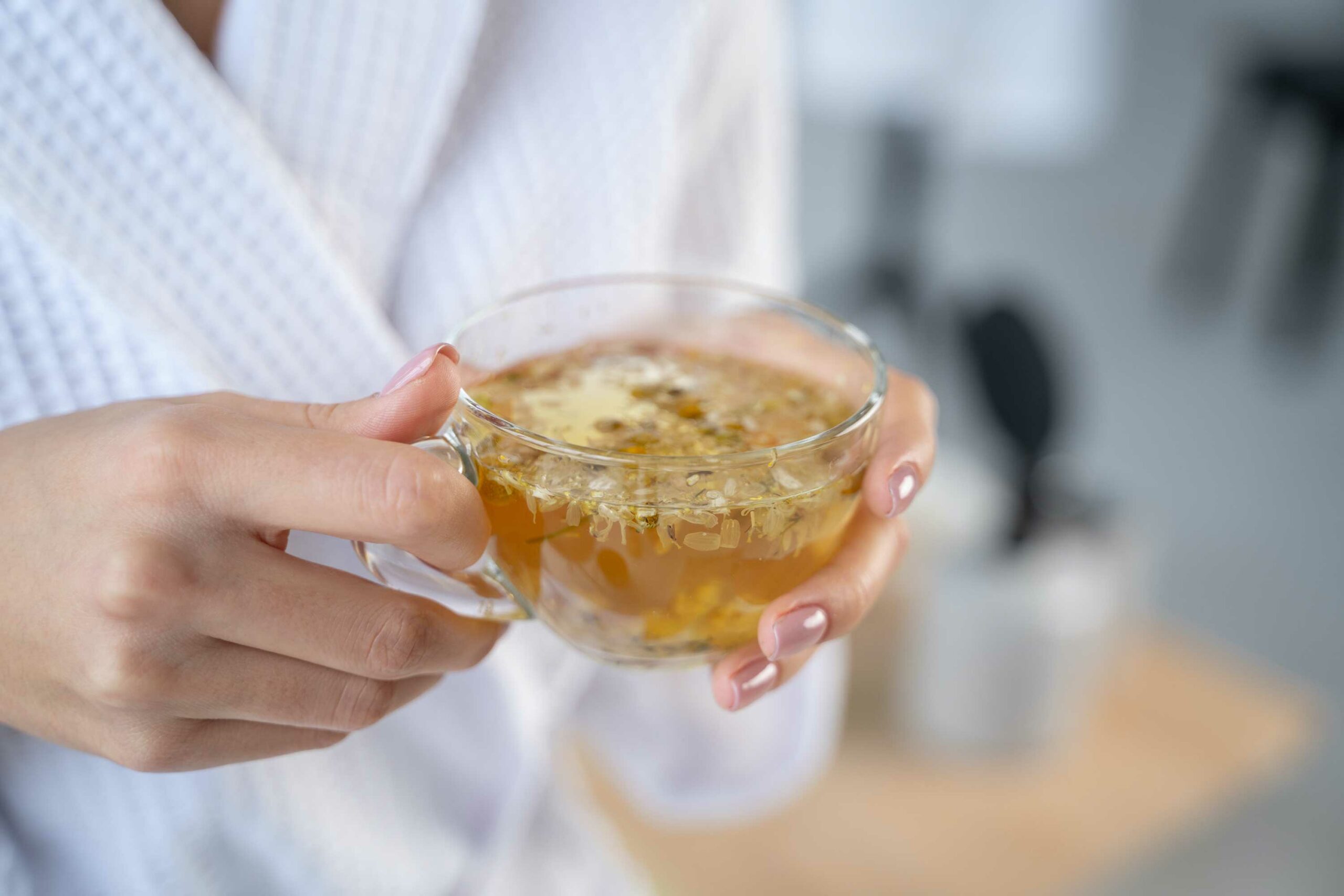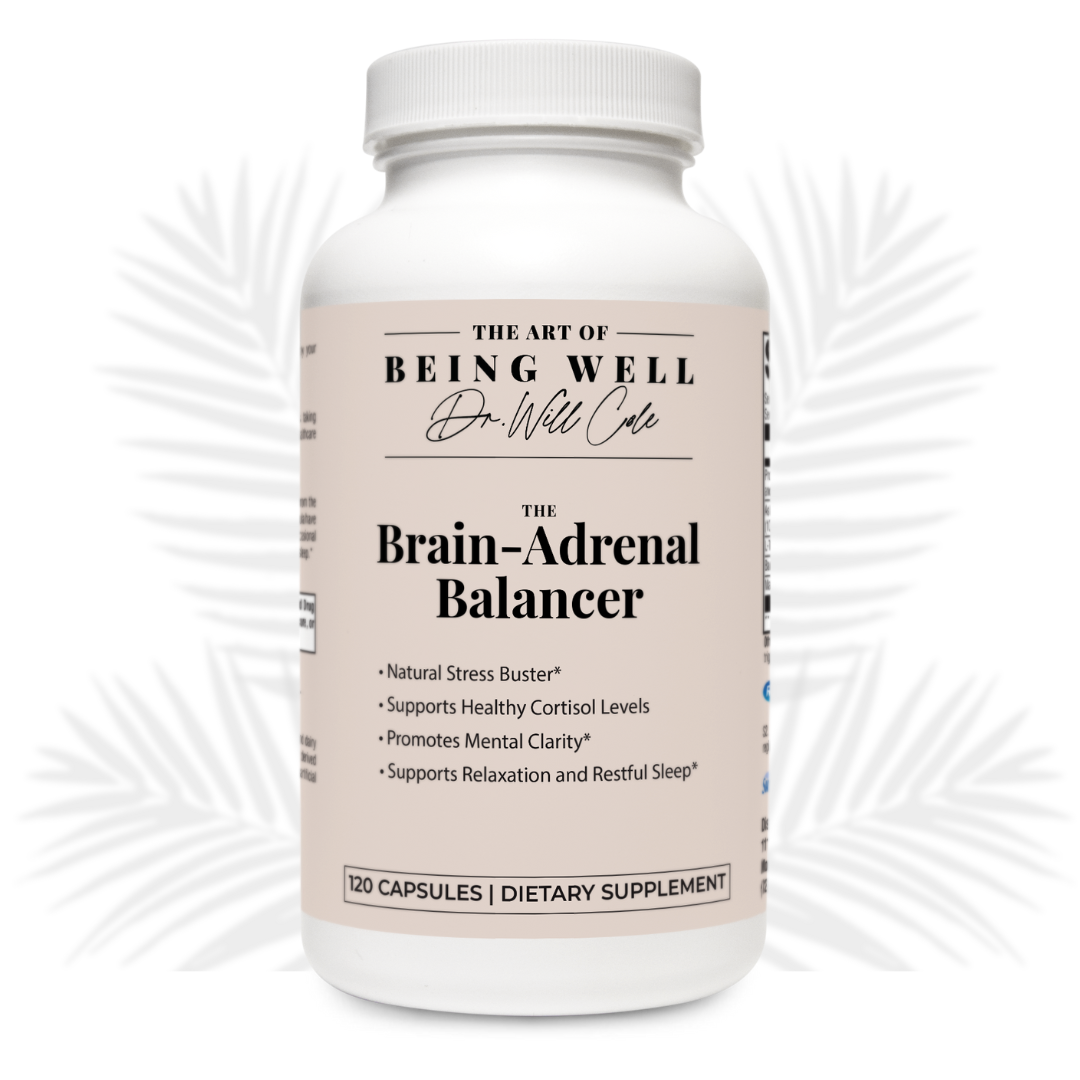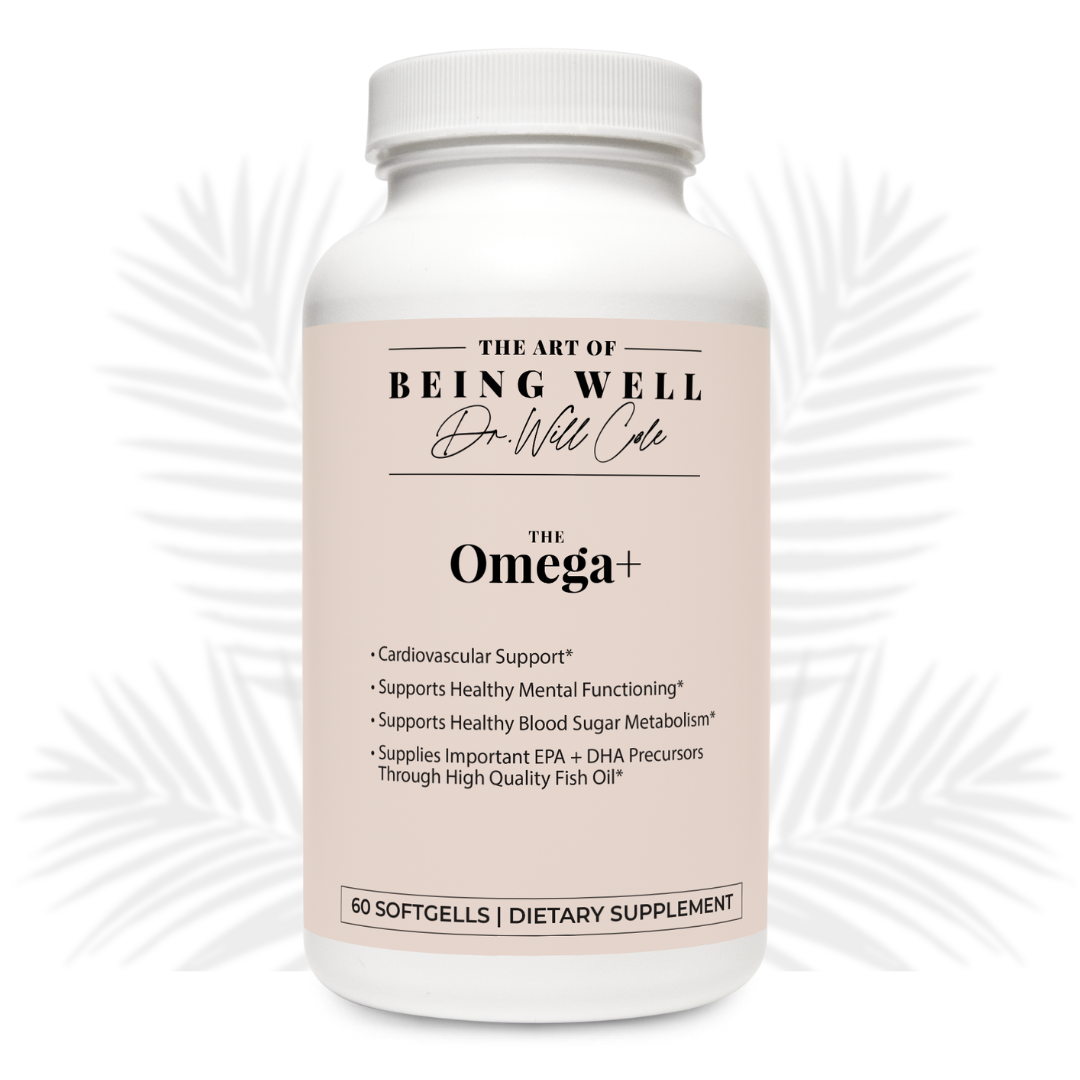The Best 15 Natural Supplements For Stress And Anxiety

Dietary and lifestyle changes are key components in reducing stress levels and anxiety, but supplements can support you as you work toward improving both.
The best supplements for stress and anxiety depend on your overall wellness, existing medications, and any nutritional deficiencies. This list includes my favorite natural supplements I share with patients for improved mental health and stress relief.
ARTICLE CONTINUES BELOW
Make Your Life a Cleanse
SUBSCRIBER-ONLY GUIDES FOR GUT HEALTH, VIBRANT ENERGY, HEALTHY FOOD & CLEAN ALCOHOL
Get FREE access to these + giveaways, recipes, & discount codes in personal emails from Dr. Will Cole.
1. Ashwagandha
Ashwagandha is an adaptogenic herb that can help regulate cortisol, your body’s stress hormone, and enhance your body’s resilience to stress. (1) Studies show it may also have positive effects on sleeplessness and fatigue, two key predictors of oxidative stress. (2)
Researchers think this is thanks to the herb’s effects on the hypothalamic-pituitary-adrenal (HPA) axis, the body’s main stress response system. (3) Ashwagandha appears to limit the activation of that system, which means fewer self-reported stress and anxiety symptoms and a calming effect.
Shop This Article
Adaptogens are natural substances that help your body manage stress. The Brain-Adrenal Balancer features a curated, proprietary blend that includes ashwagandha and other stress-relieving adaptogens to support healthy cortisol levels
Support relaxation. Support better sleep. Fight back against the fatigue of chronic stress.
2. Mucuna Pruriens
Mucuna pruriens, a medicinal legume also known as velvet bean, is often described as nature’s “chill pill” for its neuroprotective effects. This bean includes high levels of the compound levodopa (L-DOPA), a precursor to dopamine used in treating Parkinson’s disease patients. (4)
When it comes to brain health, L-DOPA has shown some promise in treating inflammation, depression symptoms, and anxiety in animal studies. (5) More research is needed to better understand how it affects humans.
3. CBD
CBD, the non-psychoactive compound in cannabis, is best known for alleviating anxiety and mitigating pain. It does this by interacting with the endocannabinoid system, which plays a part in behavior, mood, and sensory processing. (6)
CBD also affects your brain, particularly the amygdala and the prefrontal cortex. These two areas are most closely linked to levels of anxiety. (7)
For those with chronic pain from gastrointestinal conditions, muscle tension, or other health concerns, CBD may relieve some of those symptoms by reducing inflammation. (6) That effect on your body’s pain receptors comes without the intoxicating effects of other pain meds, too.
4. Zinc
Research has correlated an imbalance of zinc and copper, or more specifically, increased copper and decreased zinc, with symptoms of anxiety. (8) That’s likely because this trace mineral ratio is responsible for proper neurotransmitter function, particularly as it relates to serotonin. (9)
Serotonin is known as the “happy hormone.” Too little serotonin can influence everything about how satisfied you are, from hunger to body temperature to mood. Healthy levels of serotonin can help you feel calmer and more relaxed.
5. Rhodiola
Rhodiola is an adaptogenic herb that enhances the body’s resilience to physical and mental stress. (10) It has a long history in traditional medicine as a way to improve mental acuity and beat back fatigue, but studies are more mixed on those uses.
It’s in a similar category to ashwagandha in terms of how it helps you relax and find calm.
6. L-Theanine
L-theanine is the most common form of theanine, an amino acid with a long history of treating anxiety and stressor-related disorders due to its effects on reducing cortisol. (11)
It’s found primarily in green and black tea and some mushrooms, so timing when you consume this supplement is important. Those sensitive to caffeine may want to avoid teas containing L-theanine before bed despite those relaxation effects. Others may be fine with green teas containing a lower dose of caffeine.
7. Magnesium
Magnesium glycinate is one of the best supplements for anxiety and stress thanks to its multi-pronged approach to regulating stress in the body. (12) The mineral helps regulate cortisol and serotonin levels and calms receptors in the brain that manage anxiety levels.
Low levels of magnesium can have the opposite effect and impact your mood and sleep. Hypomagnesemia, a condition caused by magnesium deficiency, is more common in the elderly, but a general magnesium deficiency is more common due to the mineral’s low absorption rates.
Healthy magnesium levels support better rest, stress management, and cognitive function. If you’re looking for a magnesium supplement to help with stress, sleep, and mood, The Magnesium is formulated with enhanced bioavailability in mind.
8. B Vitamins
B vitamins, including vitamin B6, B9 (or folate), and B12, are essential to brain function, mood, and a healthy stress response. (13) B-complex vitamins act as fuel for neurotransmitters like gamma-aminobutyric acid (GABA) that play a part in blocking harmful signals to the brain.
Deficiencies can cause fatigue, confusion, a weakened immune system response, and depression symptoms. That’s why many physicians consider B vitamins the number one vitamins for reducing both stress and anxiety and one of the best supplements for anxiety and depression.
Eating a balanced diet that includes foods like salmon, leafy greens, and legumes rich in vitamin B can support a more balanced mood and alleviate stress. Multivitamins and anxiety relief supplements containing B vitamins can help when your diet isn’t making the cut.
LISTEN: The Rising Anxiety Epidemic + How To Calm Your Mind With Food | Dr. Uma Naidoo
9. Vitamin D
Healthy vitamin D levels support balanced hormones and brain function, two essential components of chronic stress management. Vitamin D deficiency, one of the most common nutritional deficiencies among Americans, is linked to both sleep and mood disorders. (14)
Poor diet, a lack of adequate sunlight, certain medications, and conditions that cause malabsorption of nutrients can all cause a vitamin D deficiency. If you’re noticing signs of low vitamin D, like fatigue, muscle cramps, or mood changes, vitamin D supplementation can help.
I formulated The D3-K2 with highly bioavailable forms of vitamin D3 and vitamin K2, two nutrients that enhance absorption of one another, to support optimal levels of both. Support healthy bones, a healthy heart, and a healthy mood.
@drwillcole Today's #FunctionalMedicineFriday topic is about the top nutrient deficiencies I see in patients with autoimmune disease. Luckily, many of these levels can be restored entirely naturally, whether that's through food medicines or supplementation. At my telehealth clinic, we uncover the best strategy for each of our patients depending on their unique biochemistry and health history. Learn more about our work at the link in my bio. #functionalmedicinedoc ♬ original sound - Dr. Will Cole
10. Melatonin
The hormone melatonin has a less direct (but no less important) impact on stress and anxiety due to its effects on regulating sleep-wake cycles as a sleep aid. Getting enough sleep is essential for stress resilience and emotional regulation, especially if you have insomnia or anxiety disorders.
Melatonin's role in promoting restorative sleep can help alleviate symptoms of stress and anxiety like irritability and mood disturbances. Foods with melatonin, like sweet cherries, or supplements may also help reduce oxidative stress in the body, a risk factor for anxiety disorders. (15)
11. Valerian Root
Valerian root extract is an herb often used to treat anxiety, stress, and insomnia for centuries due to its mild sedating effects. Researchers believe it may have an effect on connections in the brain responsible for anxiety symptoms. (16)
Bonus: If you have a hard time sleeping, there are few supplements better than valerian for helping you rest especially in combination with meditation.
Read Next: The Health Benefits of Meditation
12. Lemon Balm
Limited studies show lemon balm’s mild sedating effects may lower stress and improve your mood. (17) This may be due to plant chemicals in the antioxidant called terpenes that seem to cause a relaxing effect when ingested or when used as an essential oil.
13. Omega-3 Fatty Acids
Numerous studies show that omega-3 fatty acids have a positive effect on stress resilience, inflammation, cortisol levels, and depression risk. (18) A diet rich in fatty fish is the best way to get enough omega-3s, but supplements like fish oil can help when diet isn’t enough.
Shop This Article
The Omega+ has a three times greater EPA+DHA absorption rate compared to other popular fish oil brands out there. That means your body is getting the benefits of omega-3s as efficiently as possible to support your mental, cardiovascular, and metabolic health.
14. Ginseng
Ginseng root is a popular remedy for stress and anxiety thanks to adaptogenic properties that help the body adapt to external stressors. (19) It also has a mild stabilizing effect on cortisol levels, and its antioxidant properties may reduce oxidative stress for those with chronic anxiety.
15. Chamomile
Systematic reviews of chamomile show that the herb can have a positive effect on sleep quality and generalized anxiety disorder. (20) Scientists think the herb, often found in tea form, has a positive effect on dopamine and serotonin, contributing to improved mood and stress reduction.
16. GABA
The neurotransmitter GABA may help reduce anxiety symptoms in some cases. Older research suggests it’s an effective anxiety treatment, although a more recent meta-analysis shows the research is still somewhat limited. (21, 22)
Read Next: Digestive Issues? Here’s What You Need to Know About Stress + The Enteric Nervous System
A Caution About Kava
Kava is another supplement that can be highly effective for anxiety, at least in the short term, but may have other undesirable effects. (23)
A 2018 review of studies and a large placebo-controlled study in 2020 both found similar results: Kava may help with situational anxiety (think: you’re nervous about getting on a plane) but is unlikely to help with generalized anxiety disorder. (24, 25)
Plus, kava overuse may cause side effects like cognitive issues, sexual dysfunction, and liver toxicity. (26) These aren’t incredibly likely to happen unless you take more than the recommended dosage or are taking medications that interfere with kava metabolism.
Keep in mind: Any new supplement will come with limitations as far as health benefits and what it can do for different types of stress and anxiety, especially if you have other health conditions to manage.
Find Out What Supplements Are Best For You
The best natural remedies for stress and anxiety depend on the root cause of your symptoms. Working with a functional medicine healthcare professional can help you come up with a plan to address your mental health concerns and overall well-being.
The best vitamins and any recommended supplements should always come with a plan for long-term stress management.
Much like diet, supplements are just one piece of the puzzle when it comes to your mental health. Your healthcare provider is your best resource for addressing stress and anxiety levels for good.
Read Next: 4 Reasons To Reach For Sweet Cherries When Coping With Stress
Looking for a provider who will spend time learning your unique needs and working with you on an individualized plan? I’m taking new patients. As one of the first functional medicine telehealth clinics in the world, we provide webcam health consultations for people around the globe.
FAQ
Symptoms of chronic stress include:
- Fatigue
- Irritability
- Trouble sleeping/insomnia
- Skin problems, e.g. rash, eczema, acne
- Constipation
- Diarrhea
- Nausea
- Frequent headaches or migraines
- Thinning hair
- Frequent illness
- Low libido
- Irregular menstruation
- Brain fog
There’s nothing you can eat to eliminate anxiety completely, but a healthy diet of whole foods, fresh produce, and complex carbohydrates is linked to better mental health outcomes.
Fatty fish high in omega-3 fatty acids and probiotic-rich foods have also been linked to a more stable mood and reduced risk of depression.
It’s important to note here that people with food sensitivities may experience anxiety-like symptoms after consuming foods they should avoid. A dietitian or primary care physician can help you determine whether you should go gluten-free or avoid certain foods.
The history of our bodies’ stress response goes back all the way to our ancestors. When we were chased by predators, the sympathetic nervous system responded by switching the body into fight-or-flight mode.
During this stress response, the adrenal glands release cortisol, which increases blood pressure and blood sugar for faster response and better survival. Ongoing stress acts as a predator, and a constant stress signal can cause intense adrenal fatigue and affect your overall wellness.
Start Your Health Journey Today
FUNCTIONAL MEDICINE CONSULTATIONS FOR PEOPLE AROUND THE WORLD
View More At Our Store
Purchase personally curated supplements
and Dr. Will Cole’s books!

The information on this website has not been evaluated by the Food & Drug Administration or any other medical body. We do not aim to diagnose, treat, cure or prevent any illness or disease. Information is shared for educational purposes only. You must consult your doctor before acting on any content on this website, especially if you are pregnant, nursing, taking medication, or have a medical condition.
Our content may include products that have been independently chosen and recommended by Dr. Will Cole and our editors. If you purchase something mentioned in this article, we may earn a small commission.

BY DR. WILL COLE
Dr. Will Cole, DNM, IFMCP, DC is a leading functional medicine expert who consults people around the globe, starting one of the first functional medicine telehealth centers in the world. Named one of the top 50 functional and integrative doctors in the nation, Dr. Will Cole provides a functional medicine approach for thyroid issues, autoimmune conditions, hormonal imbalances, digestive disorders, and brain problems. He is also the host of the popular The Art of Being Well podcast and the New York Times bestselling author of Intuitive Fasting, Ketotarian, Gut Feelings, and The Inflammation Spectrum.

Gut Feelings
Healing The Shame-Fueled Relationship
Between What You Eat And How You Feel


